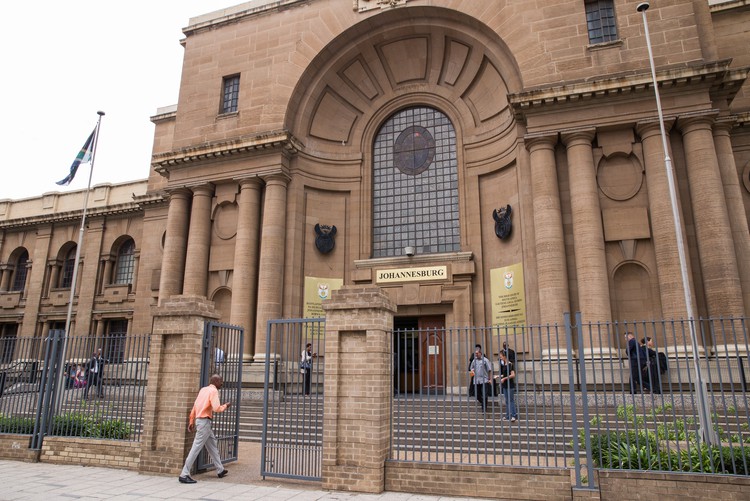Judicial Conduct Committee split over action against two judges
The judges were late delivering numerous judgments and now face disciplinary hearings
This week the JSC recommended that two judges be suspended for late judgments. Archive photo: Ashraf Hendricks
This week the Judicial Service Commission recommended to President Ramaphosa that he suspend two judges, Judge Tshifhiwa Maumela and Judge Nomonde Mngqibisa-Thusi, immediately pending the outcome of a Judicial Conduct Tribunal hearing. The judges failed to deliver their judgments timeously.
Both complaints were laid by Judge President Dunstan Mlambo, the head of their court: the Gauteng (Pretoria and Johannesburg) division.
A Judicial Conduct Committee (JCC) consisting of Justice Dumisani Zondi, Judge Nambitha Dambuza, Judge Phineas Mojapelo and Judge Margaret Victor considered the complaint. They recommended to the JSC that the complaints be referred to a Tribunal for investigation.
But the JCC’s decision was split, with Judge Zondi and Judge Dambuza recommending referral to the Tribunal, while Judge Mojapelo and Judge Victor thought this was too harsh. Judge Zondi, however, had the casting vote.
The issue of long outstanding judgments had long been a thorn in the side of the judiciary.
GroundUp reported this week that the South African judiciary has failed to provide any updated reports on late judgments since December 2021.
The last available list on the Judiciary’s website is for 31 December 2021. At that time, nationally, there were 156 court judgments outstanding for six months or more, and 830 judgments outstanding in total. We noted that without an updated report, it is impossible to determine whether these numbers have improved or worsened.
The two judges had dozens of outstanding judgments - way beyond the time limits prescribed by the judicial norms and standards that judgments, save for exceptional cases, must be handed down within three months.
The complaint against Judge Maumela, who also happens to be the presiding judge in the ongoing criminal trial of those accused of the murder of soccer star Senzo Myiwena, involved 12 judgments which had been outstanding from 24 to 26 months.
All were delivered subsequent to the lodging of Mlambo’s complaint.
In consideration of the complaint, Judge Dambuza (with Supreme Court of Appeal Justice Dumisani Zondi concurring), described all the judgments and dealt with Judge Maumela’s response which included details of ill-health he suffered during that time, personal issues and an apology “to all those affected by his inability to work”.
The JCC judges, in the majority, said it was not within the powers of their committee to grant pardon to him, but to determine the forum which should do that.
“It is troubling that this is not the first time the Judge President has complained about the judge. In the earlier complaints, the judgments were reserved starting from as far back as 2010. This gives the impression that the problem may be recurrent. The potential harm to litigants if the complaint were to be established is quite serious. The matter requires more thorough investigation with more input from the Judge President,” the judges said.
The majority said that the complaint should be investigated by a tribunal to determine if Judge Maumela is guilty of gross misconduct, gross incompetence or suffers from incapacity.
But Judges Mojapelo and Victor said while the complaint painted a picture of judicial misconduct, Judge Maumela’s response painted a picture of a judge struggling over a long time with health problems.
A more open-minded approach was needed, they said. Without this, the mental health of judges would not be recognised and factored into their workplace environment, even though society recognised mental health as a key factor in the workplace.
They made a similar recommendation in respect to Judge Mngqibisa-Thusi, who also raised personal health and family issues as a reason for her not handing down 20 judgments within the prescribed time period.
Again, the dissenting judges said the excuses the judge had proffered were societal in nature “and may manifest in other spheres of government and in society in general”.
“The judiciary should not isolate itself from societal problems as it is part of society.”
Referring to Mngqibisa-Thusi’s belief in African spirituality, the dissenting judges said this was not a problem but a “new challenge”.
“The novelty should not be a reason for rejection because rejection may be a demonstration of bias towards what is inherently African in an African society. It is important that we accept and adopt a sensitive approach to African spirituality … it should be recognised for its therapeutic richness.”
The dissenting judges said the well-being of judges was important, their role was played out in a highly adversarial environment with heavy workloads, intense emotional investment, long working hours and an inroad into family time.
They said there were different remedies to deal with the issues including a (pretribunal) section 17 inquiry - one that does not carry the threat of impeachment - and which was more “open-minded and would recognise the mental health of judges in the workplace”.
Following the JCC’s findings, the JSC, in a majority decision, recommended to President Ramaphosa that both judges should be suspended, but must deal with all current matters before them.
Next: Popular TV show fined for domestic violence episode
Previous: Crackdown on judges for late judgments
© 2023 GroundUp. This article is licensed under a Creative Commons Attribution-NoDerivatives 4.0 International License.
You may republish this article, so long as you credit the authors and GroundUp, and do not change the text. Please include a link back to the original article.
We put an invisible pixel in the article so that we can count traffic to republishers. All analytics tools are solely on our servers. We do not give our logs to any third party. Logs are deleted after two weeks. We do not use any IP address identifying information except to count regional traffic. We are solely interested in counting hits, not tracking users. If you republish, please do not delete the invisible pixel.



